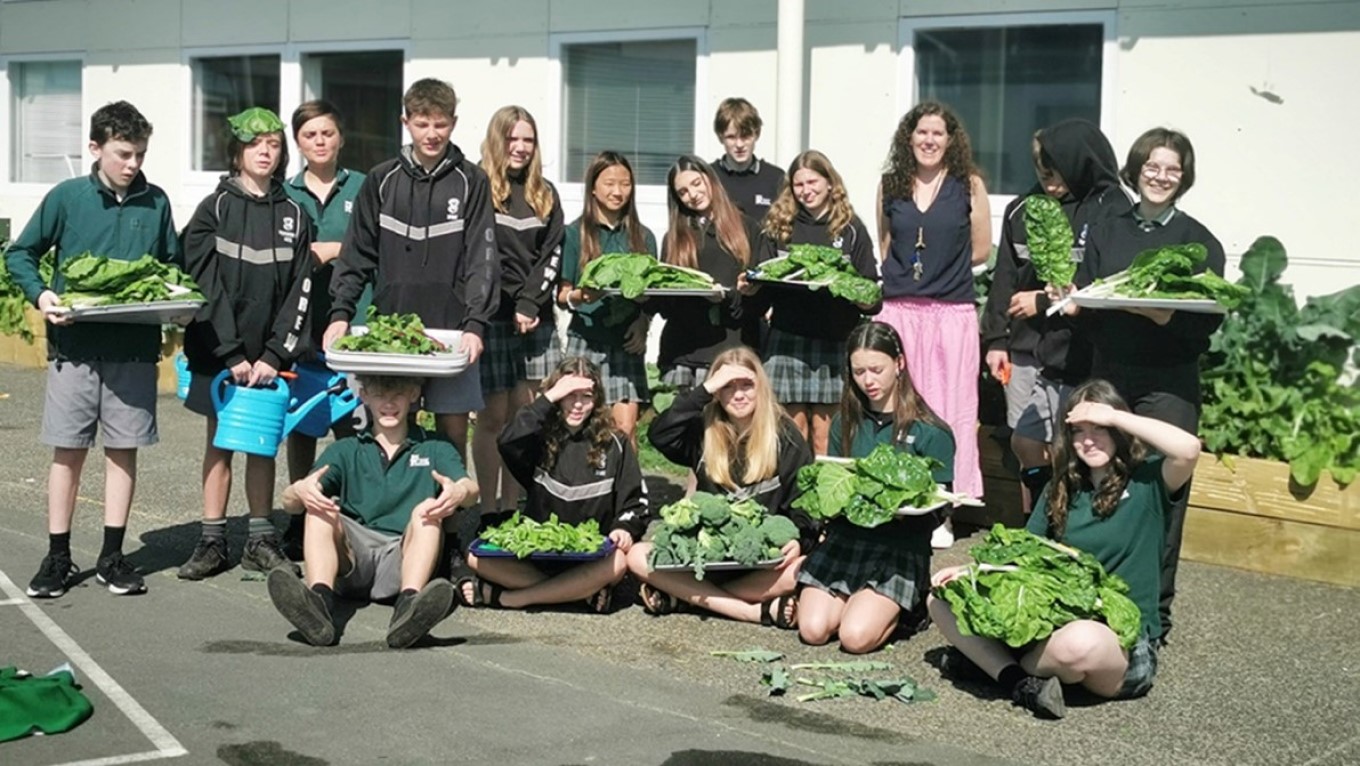A climate action programme piloted by Auckland Council’s Sustainable Schools team was successful in enabling students to take the lead on decarbonising their school, according to an independent evaluation on Knowledge Auckland.
The project, Mana Ora: students decarbonising schools, was implemented in 2023 and aimed to inspire students to plan and apply sustainability projects linked to decarbonisation within their schools through practical projects, collaborative learning, and real-world experiences. It was co-funded by the Westpac New Zealand Government Innovation Fund, Auckland Council and Ministry for Environment.
Eighteen projects were implemented in early childhood, primary, and secondary schools including five projects within Māori medium kura kaupapa Māori and kohanga reo. Students and teachers were encouraged to explore five themes to provide inspiration for their project: Transport, Energy, Waste, Food, and Grow.
Auckland Council’s Sustainable Schools Team Manager Bridget Glasgow says the evaluation found students were surprised to see how many ways they could act on climate change and sustainability in their own school and how easy it was.
“The extreme weather events of 2023 brought the impact of climate change into students’ daily lives,” Bridget says.
“The pilot has helped us communicate the connections between transport choices and climate and explores energy and food security.
“It’s been exciting working with students to help them build their knowledge and confidence in this space.
Meadowbank Primary is an Enviroschool that took part in Mana Ora. The school has a long history of integrating sustainability into teaching and learning, but one concept was always tricky to communicate – greenhouse gases and their impacts on our climate.
Led by teacher Jude Hannan, her Year 6 enviro group student Maggie Robinson pitched an idea for influencing travel choices. Celia Wells from GNS Science and Jude hatched a plan to do some real-life scientific inquiry with atmospheric equipment.

Over a six-week period, GNS Science carbon dioxide and carbon monoxide sensors were fitted to a fence in the school drop-off area. These tracked the concentration of gases in the atmosphere and were able to detect clear peaks at the morning drop-off time. The sensor data supported the enviro group’s observations that many students were being driven to school.
“It’s felt like a genuine two-way collaboration, with the students being interviewed by the GNS social scientists, which gave the students a confidence boost, knowing their voices mattered. It’s important we listen because it’s their future,” says Jude Hannan.

In response, the enviro group designed a campaign to encourage students and whānau to swap out car trips for active transport trips. The activities, supported by Auckland Transport, involved Glam Your Wheels Monday (celebrating scooters and bikes), Wear What Ya Want Walking Wednesday (mufti day for walkers) and Feel-Good Friday (encouraging walking to school with friends).
The alternative modes of travel dramatically reduced the emissions detected by the carbon dioxide and monoxide sensors, to the point where the festival period was comparable to the school holidays.
“We’re going to do Wheels Wednesday and Feel-Good Friday every week for the rest of the year,” says Maggie, the Year 6 Meadowbank Primary School student.
For Ōrewa College, another participating school, the Mana Ora programme offered an opportunity to invest in infrastructure for onsite food production and curricular innovation.
Year 9 Soft Technology teacher Kate Newman headed up the project and laid the foundations for a food tech and hospitality curriculum that engaged students in the cycle of food production and built understanding of food waste and food miles.

Over 20 volunteers – including students, staff, parents, and members from the local Ōrewa Community Garden – took part in constructing the beds, layering compost and planting vegetables.
“They’ve loved the hands-on aspect, loved the doing rather than just the theory. So, we garden once a week, cook once a week and do one session on theory,” says Kate.
“We’re also in tune with the garden – so if the beetroot needs to come out, we’ll use beetroot that day,” she adds.
The evaluation, completed by NZCER, found Mana Ora succeeded in achieving its intended outcomes.
Students said it was “empowering” to see ways they could act on climate change and sustainability issues through making a change in their own school.
Lead teachers said Mana Ora had contributed to their confidence and knowledge to teach about and inspire climate action learning.
Advisors said that Mana Ora had helped build their own knowledge and confidence about how to “connect the dots” between school sustainability practices and decarbonisation.
For 2024, Auckland Council is funding Sustainable Schools projects that are focused on building resilience within schools and communities. The student-led resilience projects will explore topics such as creating a native wetland to alleviate excess water, installing drainage and water collection tanks to safeguard food crops, exploring spongy cities and how to modify schools to be more absorbent and deal with heavy rain events, and building resilient food systems.
If you’d like more information on how your local school could be involved, get in touch with sustainableschools@aucklandcouncil.govt.nz
And for more information on what other schools have been working on visit here:
Participating schools:
-
Pakuranga Baptist Kindergarten: Preparing plant-based recipes with our youngest learners
-
Beachlands: Becoming a community composting hub
-
Maraetai Beach: Project Waho: An outdoor classroom to unplug and unwind
-
May Road School: Te Ngā Kaitiaki o Te Auaunga Awa
-
Meadowbank School: Measuring the invisible and decarbonising the drop-off
-
Onehunga School: Communicating environmental footprints through collaborative art
-
Wesley School: Beyond bins: Expanding our view of sustainability after the floods
-
Farm Cove Intermediate: In-depth carbon crunching to capture our footprint
-
Māngere College: Decarbonising through the ceiling: LED lights for student wellbeing
-
Ōrewa College: Dirt to dinner: Freshening up food tech
-
St Mary’s College: Bring on the bins: Laying foundations for better waste separation
-
Waiuku College: Supercharging a solar powered hydroponics project
-
Kristin School: Understanding commuter choices and openness to change
The NZCER report can be found here.

